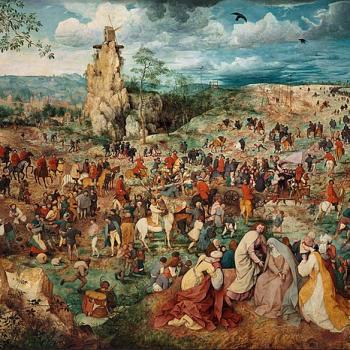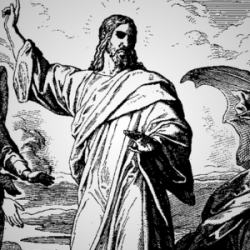By Gail Katz
This is Part Two of Gail Katz's highlights from the Parliament of the World's Religions in Melbourne, Australia. Read Part One here.
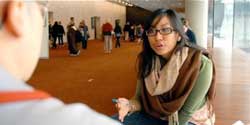 As co-founder and now president of WISDOM (Women's Interfaith Solutions for Dialogue and Outreach in Metro Detroit), I was impressed with the many sessions in Melbourne that focused on breaking through patriarchy and opening up new visions for women of faith.
Gender relations have emerged as one of the central social and political challenges for the 21st century, and they have special significance for the world's religions. New vistas are opening for women that reflect universal principles of human rights, even as a host of obstacles still stand in the way of these ideals.
As co-founder and now president of WISDOM (Women's Interfaith Solutions for Dialogue and Outreach in Metro Detroit), I was impressed with the many sessions in Melbourne that focused on breaking through patriarchy and opening up new visions for women of faith.
Gender relations have emerged as one of the central social and political challenges for the 21st century, and they have special significance for the world's religions. New vistas are opening for women that reflect universal principles of human rights, even as a host of obstacles still stand in the way of these ideals.
Check out our video interviews from the recent Parliament here.
In Melbourne, I discovered the eloquence of Sister Joan Chittister, Executive Director of Benetvision, a center for contemporary spirituality in Erie, Pennsylvania. She was a dominant figure at this conference and underlined the urgency of confronting obstacles and fully empowering women because 70 percent of the world's people in poverty are women. In her focus on gender equality, she talked about the plight of widows without dowries, illiterate girls, beaten and trafficked women - and she encouraged all of us to face the fact that religion has a lot to do with these atrocities. New research into "women-religion-and-development" is largely ignored by institutions around the world, when it should be one of the highest priorities, Chittister told her audience.
One hopeful campaign highlighted at that Parliament session is www.EndItNow.org, launched by a faith group working to end violence against women. Another recommended group is Gather The Women, which invites women to "demonstrate their courage to risk leaving old conformities by joining with millions of others throughout the world to celebrate women's true worth, to express shared concern for our human family, and to create and support actions that will enable humanity to live together in a balanced, harmonious and peaceful world."
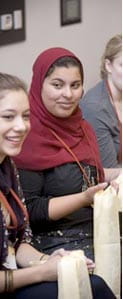 Even more impressive was The Women, Faith, and Development Alliance (WFDA). This is one global network of influential women (founded in 2006) that is trying to raise awareness about the importance of linking women's organizations, faith groups, and the international development community. This WFDA coalition is endorsed by a long list of faith groups. WFDA is becoming one of the most influential and far-reaching anti-poverty coalitions in history. WFDA's goal is to "launch a campaign that will increase financial and other investment in women and girls by governments, multilateral institutions, non-governmental organizations, corporations, and individuals."
Even more impressive was The Women, Faith, and Development Alliance (WFDA). This is one global network of influential women (founded in 2006) that is trying to raise awareness about the importance of linking women's organizations, faith groups, and the international development community. This WFDA coalition is endorsed by a long list of faith groups. WFDA is becoming one of the most influential and far-reaching anti-poverty coalitions in history. WFDA's goal is to "launch a campaign that will increase financial and other investment in women and girls by governments, multilateral institutions, non-governmental organizations, corporations, and individuals."
How sobering it was to hear from Jane Sloan, Executive Director of the International Women's Development Agency, that it would cost the world only two days of military spending to save the lives of six million women and girls!
Jacqueline Ogega, a speaker from Kenya and the director of the African Women of Faith Network, described the potential power of women. At the brutal height of the civil war in Sierra Leone, a group of women of different faiths, distraught at their children being forcibly recruited as child soldiers, boldly decided to confront the rebels in their mountain bases. They were allowed to take some of the child soldiers back with them. This incident, said Ogega, is an example of how women have contributed to resolving conflicts in Africa, even though they are largely excluded at the political level.
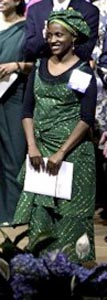 Women of faith also banded together after the genocide that claimed up to 1 million lives in Rwanda to overcome deep hatred between Tutsis and Hutus and their own personal trauma. Together, they promoted forgiveness. "Women are generally undervalued or not valued at all and are marginalized in terms of conflict resolution. Most of the time we look at women as victims of conflict rather than as resolving conflicts, and it is very important for us to shift that mentality," Ogega said.
Women of faith also banded together after the genocide that claimed up to 1 million lives in Rwanda to overcome deep hatred between Tutsis and Hutus and their own personal trauma. Together, they promoted forgiveness. "Women are generally undervalued or not valued at all and are marginalized in terms of conflict resolution. Most of the time we look at women as victims of conflict rather than as resolving conflicts, and it is very important for us to shift that mentality," Ogega said.
